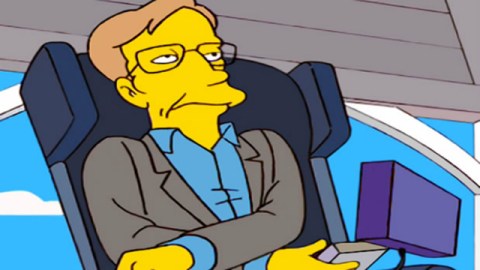Stephen Hawking 70, Lou Gehrig (‘s Disease) 0

“My advice to other disabled people would be, concentrate on things your disability doesn’t prevent you doing well, and don’t regret the things it interferes with. Don’t be disabled in spirit, as well as physically.”
– Stephen Hawking
There’s an old, endless Passover song that rattles off, one by one, all the good things Jehovah did for the Jewish people – parting the Red Sea, etc – following each item with the refrain Dayenu (“It would have been enough”). It would be easy to compose an updated, secular version about Physicist Stephen Hawking, each of whose extraordinary accomplishments in the 50 years since he was diagnosed with ALS, or Lou Gehrig’s disease, would have been more than enough for an ordinary lifetime. Consider his groundbreaking work in quantum physics, his breathtaking A Brief History of Time, which sold 10 million copies to at least 9 million people who didn’t understand a word of it, his 30-year tenure as the Lucasian Professor of Mathematics at Cambridge University – a post once held by Sir Isaac Newton.
Add to these the fact that Hawking has achieved most of this in a state of almost total physical immobility, confined to a wheelchair and able to communicate only by twitching his cheek muscles to select words on a computer screen, and that he still has enough of a sense of humor to be thrilled about appearing in cartoon form on the Simpsons, and you are left either deeply inspired or reeling at your own petty gripes and narrowness of vision.

Stephen Hawking DJs on the Simpsons. Note the bling.
The Longest Living Survivor of ALS (Lou Gehrig’s Disease)
Amyotrophic Lateral Sclerosis, or ALS, is a degenerative motor neuron disease that leads to paralysis and death, usually within five years of diagnosis. Hawking has lived and worked for 50 years with the disease – a complete mystery to ALS experts, some of whom argue that Hawking’s illness may not be ALS at all. Although he can’t personally take credit for his extraordinary longevity, it is yet another of his groundbreaking achievements.
So, from all of us here at Big Think, Happy 70th birthday, Stephen! If you had only been one of the smartest humans ever, Dayenu – but you’re something much bigger than that: a model of how to live.
A Brief History of Stephen Hawking
Jan 8 1942
Born in Oxford, England.
1953 to 1958
Attends St Albans school in North London, and becomes fascinated with mathematics.
1959 to 1962
Specialises in physics at University College Oxford. Graduates with a first class degree in natural sciences.
1963
Begins research in cosmology and general relativity at the University of Cambridge. Diagnosed with ALS.
1970
Discovers a remarkable property: by using quantum theory and general relativity he is able to show that black holes can emit radiation.
1973
Joins the department of applied mathematics and theoretical physics at Cambridge.
In the same year he discovers, to his disbelief, that black holes could leak energy and particles into space, and even explode in a fountain of high-energy sparks.
1974
His breakthrough discovery is published in the journal Nature, in a paper entitled Black Hole Explosion?
1979
Appointed Lucasian professor of mathematics at Cambridge (a chair held by Sir Isaac Newton in 1663). Elected as a fellow of the Royal Society.
1988
Publishes A Brief History of Time: From the Big Bang to Black Holes, a classic introduction to today’s most important scientific ideas about the cosmos. Recorded in the 1998 Guinness Book of Records as an all-time bestseller.
1993
Publishes Black Holes and Baby Universes, and other Essays, a collection of scientific articles exploring ways in which the universe may be governed.
1998
Publishes Stephen Hawking’s Universe: The Cosmos Explained, a book about the basis of our existence and of everything around us.
2001
Releases Universe in a Nutshell in the UK, a book that unravels the mysteries of recent breakthroughs in physics.
2002
Releases On the Shoulders of Giants, The Great Works of Physics and Astronomy, an exploration of some of the greatest visionaries in the history of science including Copernicus, Kepler, Galileo, Newton and Einstein.
Publishes The Theory of Everything: The Origin and Fate of the Universe, a book that presents the most complex theories of physics past and present.
2004
Hawking announces that he has solved the Black Hole paradox, which has been a troubling scientists for years. He presents his most recent findings at the international conference on general relativity and gravitation in Dublin.
2005
Publishes God Created the Integers and A Briefer History of Time
2007
A statue of Hawking by renowned late artist Ian Walters is unveiled at the Centre for Theoretical Cosmology, University of Cambridge.
2009
Awarded the Presidential Medal of Freedom, the highest civilian honor in the United States.
*Thanks to reader jvinopaul for noting an error in the introduction to Big Think’s audio interview with Stephen Hawking. The original headline mischaracterized the subject matter of the interview.





